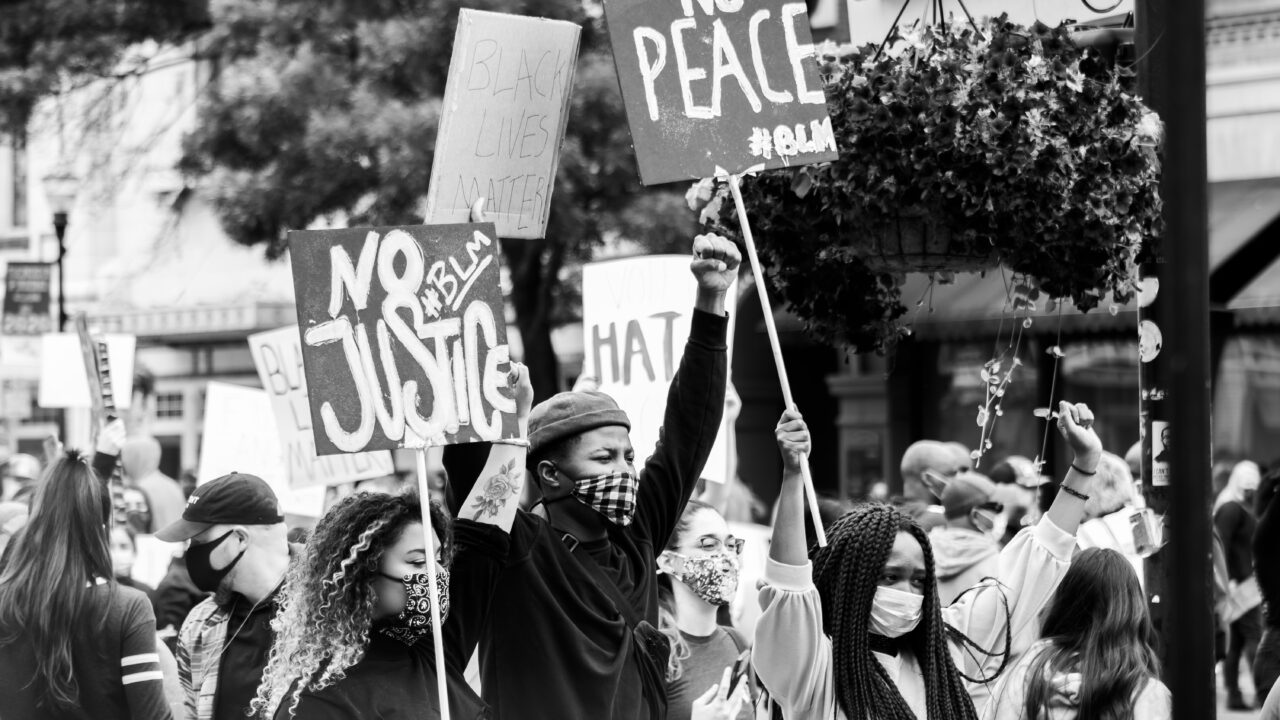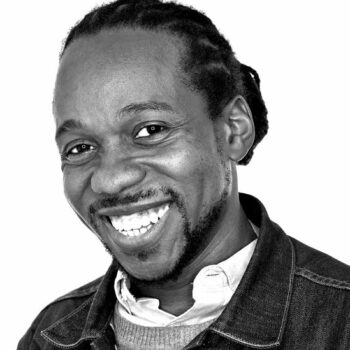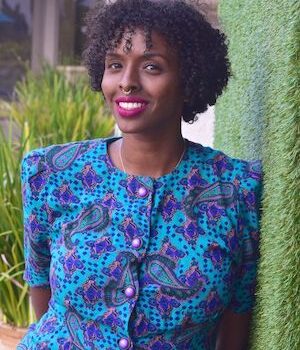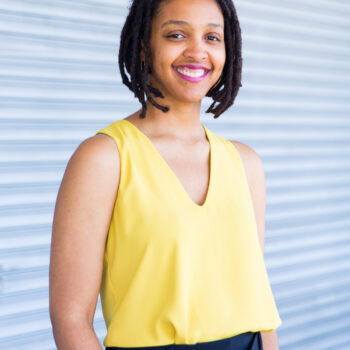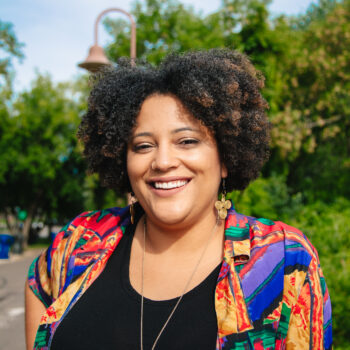Maurice Mitchell is the National Director of the Working Families Party. Rukia Lumumba is the co-founder and executive director of the People’s Advocacy Institute, an organization building capacity for transformative justice movements in the South. They sat down with our three guest editors — Kandace Montgomery and Miski Noor of Black Visions and Solana Rice of Liberation in a Generation — to talk about what co-governance means, the relationship between elected officials and movements, and how we build decision-making processes rooted in community. This interview has been edited and condensed.
Miski Noor: What does a future with community governance look like to you?
Rukia Lumumba: For me, it is a world where our communities, our neighbors, our family members are able to actually engage in developing policies, budgets, practices; that we begin to envision what it means to not just have representation in government but actually have government that’s coming from the people. What if there are community mayors? And everybody in your neighborhood gets to be mayor for a certain period of time. What does it look like for that to lead to larger community or citywide assemblies? It may not look like the traditional voting mechanism — may look like more rank style voting, may look like consensus building, may look like so many things that we just haven’t taken the time to really build and envision.
Maurice Mitchell: Traditional American politics is very entrepreneurial. It’s like, one day I wake up and I’m like, “Moe Mitchell should be mayor.” And then I call a consultant, I’m like, “Hey, I think Moe Mitchell should be mayor.” And we come up with a plan that involves them putting together some donors and maybe doing some testing to figure out what my issue agenda should be. And then I attract the people, and if we’re successful at lining up the issues and the donors and the people, I get elected.
What I’m interested in is flipping it. What happens if we start with the people, and we create the democratic spaces for the people from the ground up to develop and sharpen a people’s agenda. That people’s agenda requires the people to make electoral interventions. And then, from the people, we decide: who are the accountable folks who we are going to run for election so that they could advance the people’s agenda? To me, it’s about flipping what has been a very personal, careerist focus to something that is very much rooted and accountable to people.
RL: That’s the process of our intervention right now. But as abolitionists, what does it look like to deconstruct those systems? What does it look like that the DA doesn’t exist as a DA anymore? And we begin to envision a new legal system that’s actually about accountability and rehabilitation and restoration. Remember, it’s a process, and our end can’t be electing these people, even if they come from the people. Our end has to be deconstructing the very systems that exist to create what we need.
Kandace Montgomery: How do we build towards that? How do we start to change the strategies that we are prioritizing to actually get to a place of community governance, to actually get to a place of abolition?
MM: One of the things that we tend to do — even with our cherished movement candidates — we do all this work that’s really intensive, really expensive from the standpoint of our time, our labor, our money, our psychic energy in order to get somebody elected and then we drop them off in city hall like we’re dropping them off at daycare. And then when they do something or say something that we feel is misaligned with us, we respond [with] dismay or disappointment. Individuals, even the best individuals, don’t individually have the power to undo a system. We should anticipate that the best amongst us will encounter these really tough contradictions, and it’s our duty to make sure that they’re engaged in these contradictions with us as comrades, not alone, because no one person can transform a system. So, to me, the work has to be about figuring out how that electoral movement transitions into governance and how we don’t see our folks that we put into those positions as targets but as comrades.
And there’s a tension there because there are limitations to what one can do in any legislative body. But to me, that’s okay. We should just see this as a tool. So, we have a comrade on city council, they could do this, but we’re clear that there are things that they can’t do. That’s why we have comrades on the outside who are doing direct action. So, seeking to look at our movement as an ecosystem. Constantly pushing the boundaries but recognizing that they are part of a system, and it’s our job to make sure that they’re not captured by that system.
If we’re talking about co-governance, then we need to deal with those contradictions that are often really uncomfortable. We want to do transformative things, but especially Black cities often don’t have the resources, don’t have the capital to do those things. And so, when our folks get into office and seek to make the transformative happen but don’t have the capital, many of our folks get disappointed and say, “Yo, you’ve abandoned us.” No, we actually have to struggle around how we come up with a strategy to develop the capital and capacity to make these hard things happen.
RL: I agree with Moe that oftentimes we elect people, and we haven’t had those deep conversations around how decision-making is going to happen. But we have to begin to also think of structures that allow whole communities to be a part of the process. How are you involving community members in participatory development? For example, in the city of Jackson, we have the people’s assemblies. The city development plan is no longer reserved for this consultant group that determines the twenty-year plan; it’s actually developed by residents. That’s the first time in history that this city has done that.
Tools like participatory budgeting are important. Residents should have the opportunity to actually engage in the entire budget process. And yes, that means that there are some components that will feel overwhelming and heavy and you can’t change it, but why shouldn’t people know about that? Why shouldn’t people know that there are laws that prevent you from changing the salary of this particular department because of this, that, and the third; that gives people context. We have to create ways for community at large to engage in the actual operation of the city.
Solana Rice: One of the things that’s really resonating for me is that this is expensive and that we need capital, we need time, we need space so that folks can get educated, so that folks can make decisions that are really representing their interests. And that we need more infrastructure. I’m curious, from your perspectives, what does this infrastructure look like? What are the capacities that we need to build to support community governance?
RL: As community members, we have to understand that all of our resources are not going to come from the government, at least not right now, not until we build the government we want to see. And so, we need to develop some self-sustaining capital. And that includes capital that looks like, how do we collectively own the land? How do we collectively engage in business to provide the resources that we need? In Jackson, our city budget is only about $350 million; that’s nothing. We don’t have enough money to do anything real. And so what does it look like to really co-govern, meaning that you don’t just rely on governments to provide all the resources but you’re also figuring out how we help to provide for where there are gaps.
MM: Politicians have a lot of experience with co-governance, but it’s generally co-governance with capital. So, really, what we’re talking about is shifting the co-governance relationship to the people. How are we leveraging the power of ideas as a key capacity? How are we using political education on the most popular level so that people are transforming how they understand what’s possible and what government can do? And then also, how are we involving intellectual labor? How are we crowdsourcing expertise in order to provide support to movement-accountable elected officials? That is a capacity that’s going to be necessary because, like I said before, they want us to fail. [There is] a vast right-wing infrastructure that delivers ideas throughout [state] legislatures. We need to begin to build that muscle.
KM: I’ve been using this as an opportunity to read philanthropy for filth because we need resources, right? I was in a conversation with a potential funder around supporting the Yes for Minneapolis campaign; she was like, the way I’m going to be able to leverage resources is if you tell me a story of how this is going to set us up for next year. And I’m like, yes, I get that, but how do we just build infrastructures that [set] us up for the next thing and the next thing. [We need resources] in a real way, that is not just, let’s mobilize some Black people around this election, but, let’s build real structures for folks to be digging deeper with Black folks about this election, about what’s coming next year, so that it’s not these one-off things. That’s why we don’t just fund in election cycles if we’re actually interested in movement and community governance.
MM: Yeah. I mean, philanthropy is the velvet glove of capitalism, right? So, there’s only so far it could possibly go, but we need to push it to its limits. The most elegant answer is just taxing them for all the money so that the resources can go directly to the people and then we wouldn’t need a philanthropic sector. That’s actually the most common sense way of taking the money of the one percent and putting it to use for the people. But until and unless we get there, definitely we need to challenge folks who say they identify as being progressive to think differently about what giving looks like.
And to me, it goes back to ideology, actually. The far right, they’ve done a good job of doing the political education of their donor class, so their donor class is hyper ideological; they’re giving because they deeply want to achieve that vision. The challenge is that it’s asymmetrical, right? Their donor class actually benefits from their ideology. The donors who claim to be aligned with us, there’s a clear material disadvantage to them when we win, but they actually have to be in it for that fight. In order for us to be able to fuel any of this, we need some money and we need to speak with our chest about that. I can’t feed my baby’s belly on ideas.
MN: What is your vision for safety that would actually replace policing and imprisonment, and how do you keep visioning at the forefront of your work?
RL: For me, there’s no more DA, we’ve got our community-led governance, we deconstructed all of these systems. We’re all trained in mediation and de-escalation; we’re just treating each other better. It’s a part of the work that we don’t talk about, that day-to-day work around how we heal ourselves and work better with each other. We have to begin to put [healing justice work] at the center so that we can get to this place where safety is not just about shifting modes of policing but is actually about shift[ing] how we deal with each other. We have a healthcare system that actually takes care of all of us in the most beautiful way. Our folks have housing that feels good to live in. We actually have the ability to ensure that we are all fed, that we are all taken care of, and that we are really engaging in a solidarity economy. We’re building institutions that actually foster a system of sharing and caring, where our economic gain is not our goal but our mental, physical, and spiritual health is our goal. And I think we can get there.
MM: Amen. Yes, more of that. The thing that was just triggered in me is this idea that our unexamined and unhealed traumas have an exponential impact and a perpetual life, to our person, to our families and community. And conversely, our examined and healed traumas and our capacity to love and support one another also has an exponential impact and a perpetual life. How do we invest in the ways that we could heal from the physical traumas, the psychic traumas, the emotional traumas? These things that we know will have a perpetual life, will have a generational impact. And then, on the flip side, how do we magnify our capacity to love one another, to show up for one another, to engage in mutual aid with one another because we also know that that capacity has an exponential and perpetual impact.
KM: What’s being said but remains unheard?
MM: The generations of demands for Black people to be free, it remains unheard. We’re saying it as clear as day, and they’re choosing to hear whatever they want to hear. They’re choosing to hear, Oh, so we’re going to set up a commission so that we could study this problem. We didn’t say that. Oh, we’re going to change Aunt Jemima’s name. We didn’t say that. We’re going to propose that “Lift Every Voice and Sing” is sung at the beginning of the NFL — trust me, no Black person marched on any street to demand that.
So, despite the fact that our movement has escalated in popularity, which has given us useful leverage, our targets are insistent on not hearing. Even when it comes down to something as clear as Defund the Police, they’ll be, yeah, they say defund but they don’t really mean it. No, we literally mean defund the police. People choose to focus on processes, like the fact that they’re investigating the Minneapolis Police Department. Processes could go in any direction; we’re focused on the outcome. And so, I think this is a continual challenge with us. The systems continue to insist on not hearing us, and we need to be resolute in continuing to yell out clearly what our demands are.
RL: Folks are choosing not to hear the truth of our pain. I was just watching a video that I think Joy Reid must have shared on one of her shows, where they’re talking to some white folks in the South, and these people are celebrating Confederate Day. And they [ask]: what do you think people should know about the era of slavery and how your people contributed to it?
And they’re like, “Oh, what they should know is that most people were taking care of their slaves just like you would take care of a tractor. You wouldn’t want that tractor to go bad or to be uncared for. And so, our folks made sure that these people were taken care of. We wouldn’t want to hurt them because then they couldn’t do the work.” They go on to say, “Oh, and of course there were a few bad apples that were beating their slaves to death or cruel or mean, but the majority of us were not like that.”
And for me, it is a lack of acknowledgement of the pain and the trauma that they have actually caused human beings. I mean, these are descendants repeating a story that they heard over and over again from their grandparents, their great-grandparents, so forth and so on. So, there’s a truth in our pain that people do not want to believe, and they need to listen and hear.
And then the other piece is exactly what Moe said around solutions. We are offering the solutions; our people are clear about the solutions. It’s time that folks accepted, period.
